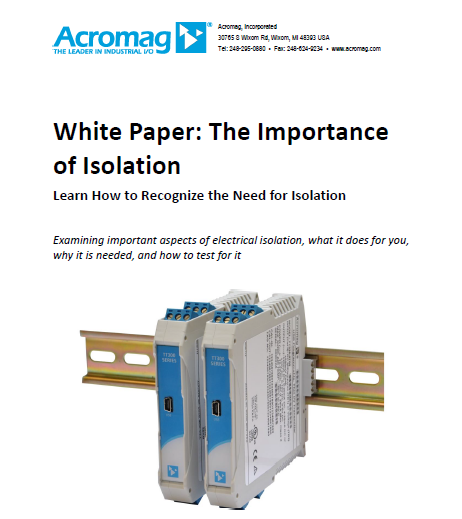Questions regarding why signal isolation is important? Why it is needed? and how to test for it are regularly asked. Acromag is in the business of signal conditioning. They manufacture circuits that amplify, isolate, filter and convert one signal form to another. They have written an informative white paper titled “The Importance of Isolation” and have made it available for download, HERE.
I have outlined the topics of the white paper below. However, let’s start with an initial question.
What is Isolation?
In summary, of what is enclosed in the Acromag White Paper titled “The Importance of Isolation” they define Isolation as:
In regards to electric circuits and electronic instruments, Isolation refers to the deliberate action to introduce a non conductive separation to stop current flow. Also, this process of blocking current flow is referred to as Galvanic isolation. This can be achieved by adding distance, clearance or an insulating material around a circuit to block unwanted current flow. However, a circuit signal may be required to be transmitted across an isolation barrier. Therefore, additional isolation of the signal would be required and this can be done in several ways such as:
- Magnetically using transformers
- Optical couplers, Optical Isolators or Fibre Optic Media
- Capacitive Isolators
Finally, Signal Isolation is achieved by a combination of physical separation and insulating material combined with a method of isolated signal transmission (magnetic, optical or capacitive). Isolation prevents the electrical conduction of unwanted current between the circuits. Whilst, still allowing the wanted signal to cross an isolation barrier without providing a conductive metal path.
This leads us to the question which is the title of this article.
Why is Signal Isolation important?
Signal Isolation is important because it blocks hazardous voltage between circuits. We generally block these voltages using isolation for safety reasons and to protect ourselves from electric shock. However, we also use them to prevent an invalid measurement or damage to test equipment. Also, Isolation is used to prevent high transient noise coming through a measurement system.
Another reason why signal isolation is used is to break potential ground loops between different instruments where unwanted current flow due to different potentials.
For more information on the topic of signal isolation, I suggest downloading Acromag’s White Paper.
The purpose of the white paper is to assist your understanding on how to recognise the need for electrical isolation.
The topics of the White Paper include
- What is Isolation?
- Common Methods of Signal Isolation
– Transformer or inductive coupling
– Optical isolator, optical couple or fibre optic link
– Capacitor
– Magno resistance
- Why do we Isolate?
– To block hazardous voltage
– For protection from electric shock
– Reject high common mode voltages
– Protect circuits from Transient Noise
– To break potential ground loop
- How to test for it
– DC Voltage Insulation Test
– Hi-Pot Testing
– Common Mode Noise Rejection
Acromag offers the industry’s best selection of 4-20mA Signal Isolators. Firstly, select from single, dual and quad channel models with AC, DC or Loop Powered Operation. Signal splitters deliver dual outputs from a single source. And whether you need a unit that sinks or sources current, Acromag will have the right solution for you. Secondly, optical or galvanic isolation eliminate ground loop errors, reduce noise and block high voltage transient surges. Thirdly, all Acromag isolators will withstand 1500V AC for 60 seconds and provide continuous 250V AC or 354 DC common mode protection of your electronic equipment. Models with push button calibration simply installation and maintenance tasks. Finally, Trip pot units are preset for 4-20mA input/output. This means field calibration is not required.
Metromatics provide local friendly sales, service and support of the Acromag product range in Australia.
For more information on Acromag Isolators, please contact us.
